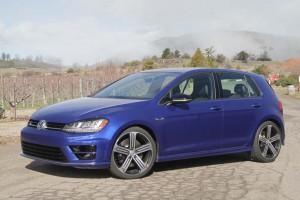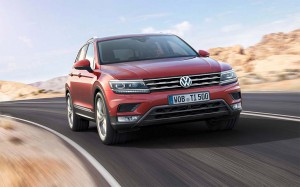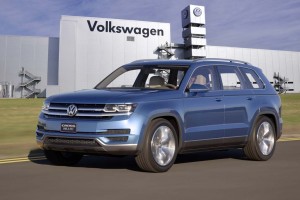
VW of America chief Michael Horn expressed appreciation to buyers who remained loyal to the brand in October.
When October auto sales were released, industry observers wondered if Volkswagen’s totals would include a dash in front of the numbers due to the diesel scandal the German maker is currently embroiled in.
The good news for VW is that it posted a small gain – 0.2% – last month, meaning no dashes, although many of its competitors enjoyed double-digit increases, often setting new records for the month of October.
Volkswagen has been trying to win customers with steep discounts and rebates, as much as $2,000, as well as offering low-cost leases.
During the first week of October, the brand’s average U.S. discount to the sticker price was 11.1%, compared with the industry’s 6.2%, according to TrueCar Inc., a website that tracks car pricing.
Sales of the company’s Golf line-up increased 40.2% compared to October last year. Passat and Tiguan sales were also up, and combined they offset the beating they took on the Jetta and Beetle, which were down 41.5% and 34.1% respectively.
It worked well enough to keep VW on the positive side of zero, but that’s expected to change next month as more information pours out about the scandal. VW leaders smartly expressed its appreciation to those who did buy vehicles last month.
(VW finds irregularities with 800,000 more cars. For more, Click Here.)
“We would like to again thank our customers for their patience and loyalty,” said Mark McNabb, chief operating officer, Volkswagen of America. “Volkswagen is committed to making things right and actively working to restore trust.”
While they did buy, all those enticements come at a cost: lower transaction prices, i.e. how much did the buyer pay for the car. TrueCar noted the automaker’s average transaction price dropped 4.8% compared to September from $40,020 to $38,084.
This made VW one of the few brands to see its average transaction prices dip last month, according to Kelley Blue Book, which reported the maker’s ATP down 3.6% from September to October.
“In fact, Volkswagen had the largest month-over-month drop as the diesel emissions issue continues to impact the automaker,” said Akshay Anand, analyst for Kelley Blue Book. “Six out of the eight vehicles within its lineup were down from last month, while only the Golf is up from this time last year, potentially reflecting Volkswagen’s need to offer their vehicles at slightly lower prices since consumer perceptions of the brand may be impacted.”
Fortunately, the company’s other brands in the U.S. – Audi and Porsche – weren’t affected by VW’s problems. Porsche was up 11% in its best October ever led by the SUVs: Cayenne and Macan that were up 104% and 22.5% respectively.
Audi also marked its best-ever October with increase of 16.8% and its 58th consecutive month of increasing sales.
“Establishing continuous sales records is the result of our long-term strategy to consistently raise the Audi profile and steadily develop new products, alongside the dedication and hard work of our dealer partners,” said Mark Del Rosso, executive vice president and chief operating officer, Audi of America.
“As we enter the holiday selling season, we remain optimistic that our Season of Audi Sales Event will trigger demand across all model lines to close out the historic year of 2015.”
(Click Here for more on the EPA’s latest allegations.)
The A4 model achieved strong sales in October 2015 with a 27.7% increase over year-earlier sales. The Audi A7 and A3 models also performed well, with year-over-year increases of 15.9% and 14.8%, respectively.
However, that could change as new allegations about Audi, Porsche and more VW models came to light this week. Federal and California environmental regulators alleged that other vehicles, including the diesel versions of the 2016 Audi A6 Quattro, A7 Quattro, A8, A8L and Q5 have software that fools emissions tests.
The agencies also said the diesel 2014 VW Touareg and the 2015 Porsche Cayenne cheat emissions test. Volkswagen, which owns all the brands, said that regulators are mistaken and that it has not cheated on tests of these cars with bigger engines.
The scandal comes at the worst time as VW has been trying to dig its way out of a long-term sales slump in the U.S. The maker’s down 2.2% through October, but a lot of positive press have been giving it some traction.
VW hoped to ride this wave of positive press and energy to the introduction of its new crossover it plans to build at its Chattanooga, Tennessee, plant starting next year. VW’s been hanging in there sales-wise despite the fact that it’s missing to crucial vehicles in the current sales bonanza: trucks and crossovers.
It had resolved the crossover question with the new model from the Volunteer State and was rumored to be pondering bringing a pickup truck for the American market, on par with the Chevrolet Colorado and Toyota Tacoma. However, it’ll have to regain the trust of the consumer, creating a difficult headwind for these two new products.
Its got to be a priority because the maker is seeing a drop on the pricing of its new vehicles and the hit is even bigger on its used vehicles, which have taken an average hit of 16% in the wake of the revelations. The numbers for the new and used vehicles are only going to grow until VW can begin fixing the nearly 500,000 diesels it has in the U.S.
(VW loses nearly $2 bil in latest quarter. Click Here for more.)
The company lost $1.83 billion in the third quarter and has set aside $7.3 billion to handle the recall, although the final number is expected to be at least three times that and one estimate exceeds $80 billion.




I doubt the new VW SUV and especially a pick-up truck will make any significant improvement in VW U.S. sales. VW needs to talk to their recent customers and find out why their first VW purchase is typically the last VW they ever buy. Talk with long term VW customers to find out how they view the VW U.S. situation. The suits from Germany might learn a lot if they listen to the market. I doubt the VW diesel scandal will have any long term impact on sales as the public learns the full details and that the actual offenses are very minor in the big scheme of life.